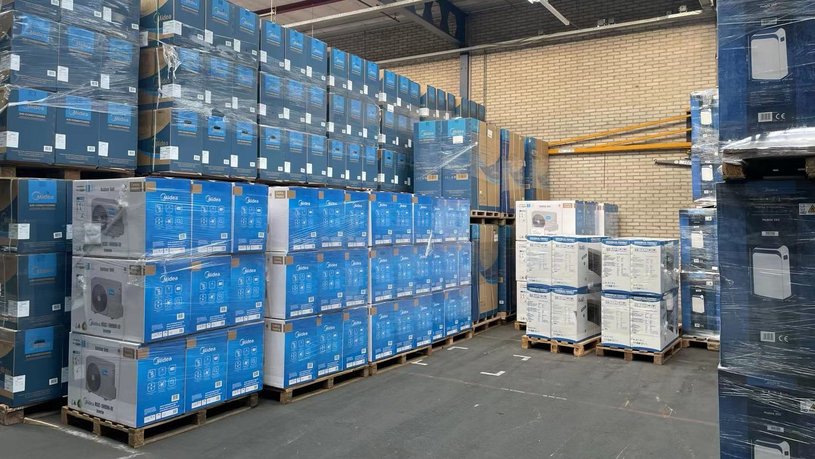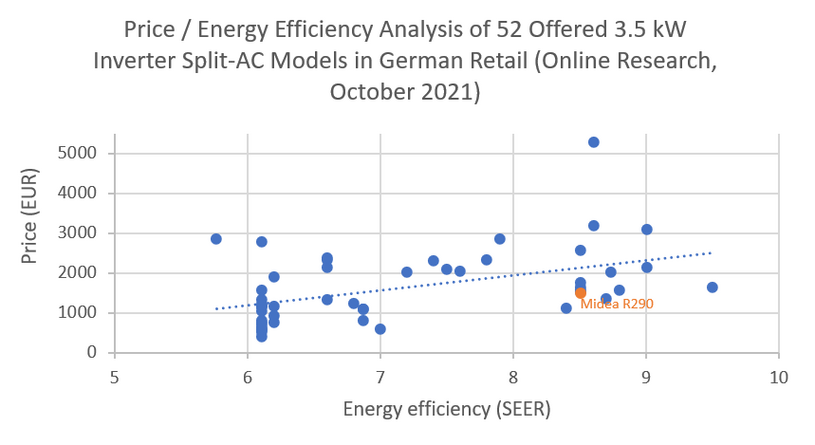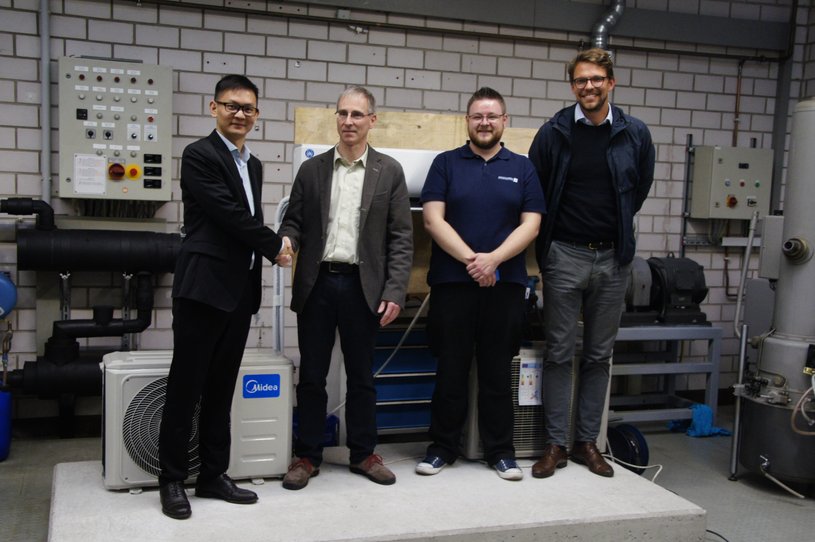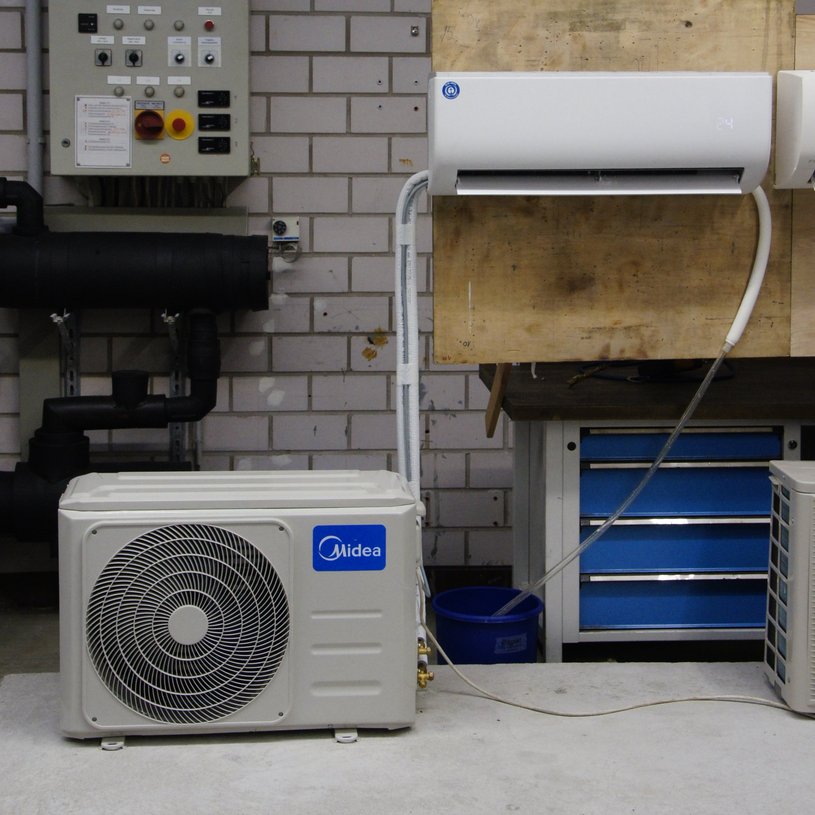Increasing confidence among dealers and installers as well as high environmental awareness among consumers mean favourable conditions for the natural refrigerant propane in split air conditioning systems. Philipp Munzinger and Julia Schabel from GIZ Proklima provide insights into the latest European market developments.
Split air conditioners with a capacity of up to 5 kW are responsible for the largest share of greenhouse gas emissions (GHG) from the refrigeration and air conditioning sector. While around 80 million units were sold globally in 2018, this figure is expected to rise to around 115 million units in 2026.[1] Even the COVID-19 pandemic hasn’t affected the market growth of the most widely used type of air conditioner in the world. In large parts of the global market, split air conditioners are characterised by only moderate energy efficiency and are powered by coal-fired electricity. Moreover, they almost exclusively use HCFC (R22) or HFC (R410A and R32) refrigerants, which are highly damaging to the climate. Without a timely shift towards more efficient systems, low-carbon power supply and climate-friendly refrigerants, the split air conditioning segment will continue to have a significant climate impact.
Split-type ACs have long since been sold and installed in huge quantities not only in countries with constantly high ambient temperatures in arid and tropical regions. In many European countries, too, split air conditioners dominate the market among direct-evaporation systems. In Germany alone, over 70% of the 157,000 room air conditioners sold were split ACs. In Europe, the HFC R410A is the refrigerant which is still used in most air conditioners.[2] However, R32 is well on its way to becoming the dominant refrigerant in the European sales and equipment inventory. Despite increasing regulation through the extension of the Montreal Protocol and the EU F-Gas Regulation agreed in Kigali in 2016, R32 is defended by many actors in the refrigerant and appliance industry as a medium to long-term intermediate in the HFC phase-down over the next two decades. However, due to their extremely high climate impact over the next 20 years (R410A has a 20 years global warming potential of 4,400; R32 of 2,530[3]), there is a particularly urgent need for climate-friendly alternatives to HFC substitutes.
Energy-efficient split air conditioners with the natural refrigerant propane (R290, GWP = 1) have been produced and sold in China and India since 2013. Despite good consumer response according to manufacturers, however, the green air conditioners have not yet made a national or international breakthrough. In an article by GIZ Proklima in the KKA issue 05/2020, the necessary preconditions and favourable factors for a broad market introduction were already examined in more detail.[4] In line with the conclusion of the article, the European Commission concluded in a study published in September 2020[5] that propane in split air conditioners up to 7 kW can be classified as a technically valid alternative to HFC-driven split air conditioners. A rapidly growing market share of R290 split air conditioners would be welcome in the context of the implementation of the EU F-Gas Regulation and its influence on policy making in other countries.
"There is a lot of demand in the market for climate-friendly and green solutions."
Midea is also positive about the potential of R290 split air conditioners. In the past, the Chinese manufacturer mainly relied on portable propane air conditioners and has been able to sell around 1 million of the devices so far. Climate-friendly split AC models were not in the product range - but that is now changing.
In autumn 2021, 220 propane split air-conditioning units reached the warehouse in Philippsburg, with further larger imports to follow in early 2022: "Thanks to the R290 split model (3.5 kW) certified with the "Blue Angel" eco-label, we now offer a comprehensive product range. The list price of the model is around EUR 1,500, which is very competitive," explains Mick Xiaowei Ma, Managing Director at Midea Europe GmbH. "We want to explicitly promote this climate-friendly model and are therefore deliberately reducing our margins in order to make the climate-friendly products more affordable for consumers.”
The product does indeed appear to be well positioned in the market, as confirmed by the market analysis carried out by GIZ Proklima. Prices and energy efficiency of 52 3.5 kW split air conditioners available in German retail (online) with stepless and automatic adjustment of the compressor speed (inverter) and heat pump function were compared with the Midea R290 model (SEER of 8.5 A+++ in cooling mode, SCOP of 4.6 A++ in heating mode). The results are impressive: The climate-friendly newcomer ranks in the premium segment in terms of performance and is one of the most affordable models therein. Unlike the HFC-based models in the same segment, the GWP of R290 comes with a negligible GWP, ranking the Midea model at the top in terms of climate benefits.
The current stock was sold to various B2B customers after just a few days and the launch of models with a higher cooling capacity (5 and 7 kW) is already in the planning. "Currently, we are focusing on being able to offer a full range of R290 split air conditioners in the next 2 years. Midea produces about 40 million split air conditioners per year in China, primarily using R410A and R32 refrigerants. With the further market development of R290 and resulting economies of scale, we will surely be able to offer a good price performance in the domestic and international market," Ma argues. But it is not only the units that are attractively priced. Propane is also cheaper to buy than conventional synthetic refrigerants, he says. In addition, it does not damage the ozone layer and has a negligible greenhouse potential.
"Especially in Germany, consumers are interested in environmentally friendly products."
Mick Ma sees the environmental benefits of the units as one of the biggest selling points: "Especially in Germany, consumers are very interested in buying environmentally friendly products. And an energy-efficient model with R290 is the most climate-friendly option in the split AC market at the moment. The Blue Angel eco-label is very helpful in marketing the product, as many end consumers have little knowledge about refrigerants". Midea itself only addresses consumers indirectly by creating more awareness among distribution partners: "If wholesalers are confident of our R290 models, final costumers will be so, as well."
In many cases, the flammability of propane is still causing hesitation among wholesalers. Technicians need training in the safe installation and maintenance of the equipment, but also in the correct transport of the gas. For this reason, Midea offers its own technician training courses and sends experts to customers to conduct on-site training. These trainings are partly carried out together with the training centre "Bundesfachschule Kälte Klimatechnik" in Maintal, Germany. Already at the end of 2018, a Midea R290 demo unit was delivered to BFS for training purposes in cooperation with GIZ Proklima.
In Germany, courses and seminars on the subject of natural refrigerants (in particular also on propane as a refrigerant) are already offered at all schools of the guilds. The handling of A2L and A3 refrigerants has become an integral part of the training curricula of both mechatronics technicians for refrigeration technology and master craftsmen.
Who are the customers?
One of the biggest current buyers of the new R290 model is ABK-Qviller AS, Norway's largest distributor of heat pumps, heat absorption, air conditioning and humidification. With an annual average temperature of 5.7°C in Oslo, no major developments are initially expected in the split AC market. However, the units produced by Midea have both a heating and cooling mode. "This is particularly important for our Northern European customers," explains Mick Ma. "We therefore expect market growth for the R290 split models to remain stable during the winter months."
"There's a huge market for these types of products."
ABK-Qviller AS has ordered a total of 50 propane split room air conditioners. "In Norway, government tenders always require natural refrigerants, and until recently there have been no natural gas models on the market for mini-split AC systems," explains Managing Director Daniel Mark Kristensen. "Buying the 50 units from Midea was a way to be first in the market and strengthen our position. " Especially the high energy efficiency of the appliances is crucial in Norway, he says. The Norwegian electricity concept is heavily based on hydropower (98%). As a result, there is a general assumption that energy consumption does not need to be reduced for environmental reasons - but it does for cost reasons. Another financial aspect in favour of natural refrigerants such as propane is the high tax on HFC refrigerants in Norway, which additionally helps to pave the way for sustainable alternatives.
Nevertheless, Daniel Mark Kristensen is still cautious about his final verdict on the devices: "There is a huge market for this type of product. However, we are still unsure about the reliability of the heating mode at very low outdoor temperatures. I suspect we will use the units more for air conditioning in the summer months." At the moment, ABK-Qviller AS is still testing the products and is carrying out a risk assessment. "In general, however, we are not afraid of them."
"In our experience, propane can be used safely if proper precautions are taken."
Interest in climate-friendly HFC alternatives in split air conditioning systems is also growing in other parts of Europe. The Colruyt Group is one of the largest retailers in Belgium with around 30,000 employees and over 500 stores. Since 2014, the supermarket chain has been using 100% natural refrigerants in all new stores to credibly pursue its sustainability strategy. Collin Bootsveld is the senior project engineer responsible for the conversion of the refrigeration systems. For him, natural refrigerants are the only realistic long-term solution: "We have 160 commercial refrigeration units using propane as a refrigerant and three industrial refrigeration units with a cooling capacity of 240 kW each. We also use R290 in small air-cooled chillers of 7-11 kW. In addition, we have R290 heat pumps. “
In all installed systems, he says, propane can serve its purpose just as well or even better than its synthetic counterparts. He believes that R290 in split air conditioners will be the predominant technology for cooling and heating in small offices and homes because of its high energy efficiency and medium- to long-term cost benefits. "In our experience, propane can be used safely if you take the right precautions," he says.
Colruyt Group is currently conducting tests with three different R290 models from different suppliers, one of the units is from Midea. "We will evaluate the physical durability, communication capabilities, noise level and other parameters," Bootsveld explains. The units will be used for cooling IT rooms. The demand is definitely there, he says: "My friends, colleagues and our management understand the logic and the benefits."
Deutsche Gesellschaft für Internationale Zusammenarbeit (GIZ) through its GIZ Proklima programme provides technical advice to developing countries and emerging economies on Green Cooling policies, technologies and as well as capacity building related to servicing and end-of-life management of cooling appliances.
[1] JRAIA (2019). World Air Conditioner Demand by Region. Available at: www.jraia.or.jp/english/World_AC_Demand.pdf (opens in a new window), businesswire (2021).
[2] JRAIA (2019). World Air Conditioner Demand by Region. Available at: www.jraia.or.jp/english/World_AC_Demand.pdf
[3]ATMOsphere (2021). Real GWP: 20 years vs.100 years. Available at: https://r744.com/wp-content/uploads/sites/3/2021/06/ATMO_future_green_V.1.1_final.pdf
[4] Refrigeration Air Conditioning Current (2020). Propane split air conditioners. What stands in the way of a market launch in Germany? Available at: www.kka-online.info/artikel/kka_Propan-Split-Klimaanlagen_3574234.html (opens in a new window)
[5] European Commission (2020). The availability of refrigerants for new split air conditioning systems that can replace fluorinated greenhouse gases or result in a lower climate impact. Available at: https://eurovent.eu/sites/default/files/field/file/ GEN%20-%201160.03%20-%20EU%20report%20refrigerants%20split%20air%20conditioners.pdf (opens in a new window)




